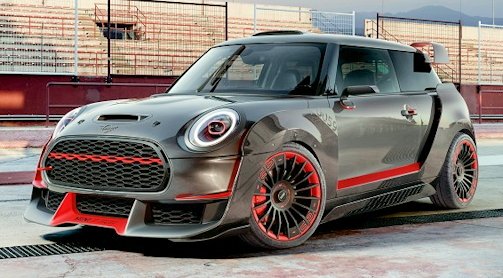John Cooper Works History
Farnborough U.K.
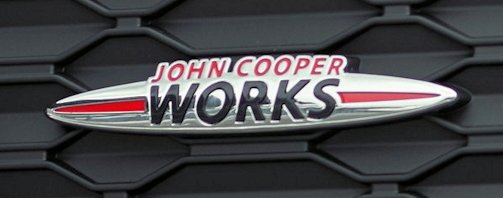
John Cooper Works (JCW) The company was founded in 2000 by Michael Cooper, the son of John Cooper, a sports car designer and tuner of the original Mini Cooper. It is a British manufacturer of tuning parts and accessories and has been a BMW Group brand since 2007 for mini models and accessories of the same name.
History
In January 2007, BMW acquired the trademark rights of John Cooper Garages, making the John Cooper Works brand officially part of the MINI brand since 2008. In the early years John Cooper Works appeared as an independent tuner. The product range included tuning kits for the models Mini Cooper and Mini Cooper S.
Cooper
The first tuning kit from JCW was a 94 kW (126 hp) conversion for the Mini Cooper. This conversion kit contained the following components:
- Machined cylinder head
- air filter
- Exhaust system from catalyst
- Software adaptation of the engine control
- emblems
Despite the price of over 2000 €, this kit only achieved a power increase of 8.2 kW (11 hp), a sportier sound and a better response. The main advantage was that the conversion could be carried out without loss of the factory warranty. In 2004, JCW quit this sentence and presented at the same time a sound kit for the Cooper. The sound kit consisted of a new intake system, an exhaust system and adjustment of the control units.
Cooper S R52 and R53
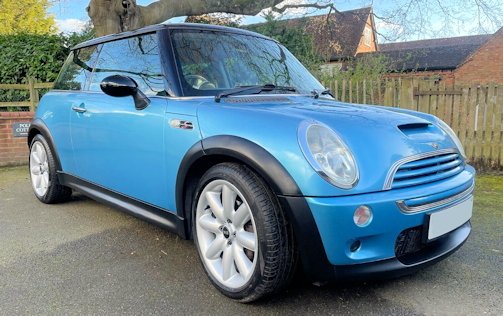
The first tuning kit for the Cooper S was a conversion kit to a total of 147 kW (200 hp). This kit was introduced in 2002 and consisted of the following components:
- Machined cylinder head
- Bigger, faster rotating compressor
- Improved spark plugs
- Improved exhaust system
- Software adaptation of the engine control
- Emblems, as well as individually numbered engine signs and a certificate with the signature of Mike Cooper
First, this kit had to be retrofitted by the mini-dealer. Only at the end of 2005, the Cooper S could be ordered directly from the factory in this configuration.
In 2005, an additional upgrade was also presented, which brought a greater performance increase to 155 kW (210 hp, specified in relevant vehicle purchase portals with 211 hp) and additionally contained the following components:
- Improved injectors
- Adaptation of the software
- Improved intake system and air filter
This service package can / could be retrofitted into older models of the series. At the same time appeared a "JCW Sound Kit", consisting of an exhaust system and air filter, which promised for about 1100 a sportier sound and a power increase of 2.2 kW (3 hp).
Cooper S R55, R56 and R57
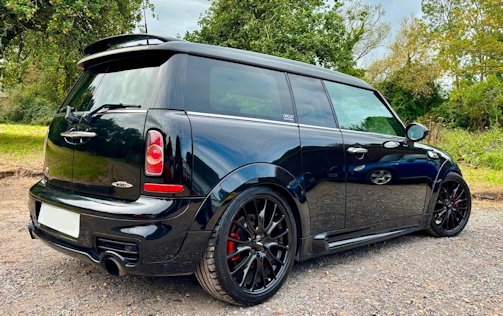
In 2007, Mini introduced the JCW Tuning Kit for the new R56 version of the Cooper S. The new model was charged by a turbocharger instead of the compressor. The kit was different from the previous version and consisted of an improved intake system, exhaust system and software adaptation. It brought a performance increase of 13 kW (17 hp) to a total of 143 kW (192 hp), a torque increase of 10 Nm to 250 Nm (270 Nm with over boost), acceleration of 0-100 km / h in 6.8 seconds, as well a top speed of 232 km / h. It became known as the "Stage 1 Kit", although this designation was never officially used by JCW or BMW.
According to Mike Cooper, this kit made it possible to produce the "fastest mini ever produced”, notably by adding torque and acceleration, making the car faster in some situations than the 163 kW (218 hp) Mini JCW GP,
In 2011, the JCW tuning kit for the Cooper S LCI (135 kW) was adapted. It consists of an improved exhaust system, intake system, exhaust manifold and software adaptation. The kit also includes a sticker on the engine with a unique serial number, as well as JCW emblems on the front and rear. With a power increase of 12 kW, a total output of 147 kW is achieved.
Integration into the MINI brand (since 2007)
In 2007/08 the acquisition and integration into the BMW Group took place. Since then, revised MINI models can be ordered directly from the factory under the JCW brand.
John Cooper Works R56
This is not another conversion kit, but a completely reworked version of the R56 Mini with model name MF91 (Clubman version MM91). This vehicle has been sold by the dealer network and includes some changes from the 143kW (192hp) Power Kit:
- Peak power of 155 kW (211 hp) at 6000 rpm and a torque of 260 Nm (280 with over boost). This is due to an improved turbocharger, larger exhaust system and sportier software customization. Acceleration from 0 to 100 km / h in 6.5 s (6.8 at the Clubman). Fuel consumption and emissions are also on the rise, although the 143 kW (192 hp) kit brings no change to the 130 kW (175 hp) standard version of the Cooper S.
- Electronic Differential Lock Control (EDLC). This is infinitely adjustable between 0 and 50%, in contrast to the permanent 30% of the optional LSD in the R56 Mini Cooper S.
- DTC (Dynamic Traction Control) as found in all current BMW models. The John Cooper Works is the first Mini to be delivered with DTC. The main difference between DTC and DSC is the ability to adjust the parameters for the traction and stability control system to allow a sportier ride without having to completely shut down the stability control.
- Brembo pot brakes, consisting of red aluminium brake callipers with John Cooper Works logo on the front, red one-piston callipers on the rear, perforated and ventilated brake discs 316 × 22 mm at the front and 280 × 10 mm at the rear.
John Cooper Works GP (2013)
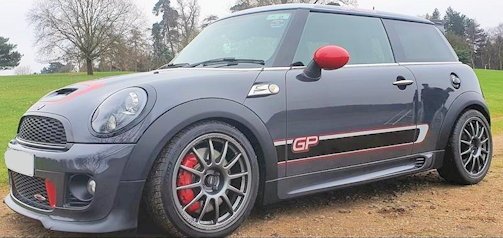
The Mini John Cooper Works GP was only built in an edition of 2000 pieces. This model is powered by a 160 kW (218 hp) turbocharged 1.6-liter 4-cylinder engine and accelerates from 0-100 km / h in 6.3 seconds, reaching a top speed of 242 km / h. The GP features exclusive 17-inch mini-challenge wheels, high-performance tires designed in cooperation with Kumho, adjustable suspension, 6-piston Brembo front brakes, red mirror brake callipers, RECARO sports seats (with side airbags) and a rear strut bar.
Mini confirmed a lap time of 8:23 minutes on the Nürburgring an improvement of more than 19 seconds over the previous model.
John Cooper Works F56 (2015)
At the end of 2015, a new JCW model was launched. It was a derivative of the F56 series, which was built since 2014 as the third edition of the "New MINI" under BMW direction.
This new John Cooper Works brings next to changed exterior dimensions, which make him bigger and beefier, a 2.0-liter twin-turbo engine, the standard 231 hp catapult him in the switching version in 6.3 seconds from 0 to 100 km / h.
Since March 2009, the Mini Convertible is available as JCW.
Coupe
The Mini Coupe was available between October 2011 and May 2015 as JCW. The vehicle was powered by the 1.6-liter gasoline engine with 211 hp. At 100 km / h, the Coupé accelerates in 6.4 seconds, the top speed is 240 km / h.
Of this vehicle there is only one for the long-haul homologated racing variant, this was used in 2018 by the racing team Racing4Emotion in the VLN at the Nürburgring.
Roadster
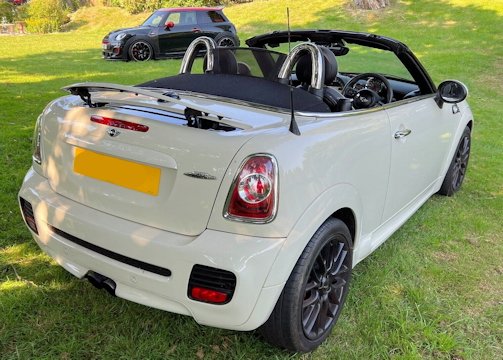
The coupe-based Mini Roadster was available between March 2012 and May 2015 as JCW. The vehicle was powered by the 1.6-liter gasoline engine with 211 hp. At 100 km / h the roadster accelerates in 6.5 seconds, the top speed is 237 km / h.
Countryman
The John Cooper Works Countryman is Mini's first 5-door JCW. This was presented in 2012 at the Geneva Motor Show. The SUV is powered by a 218 hp 1.6-liter gasoline engine, which accelerates the SUV in 6.9 seconds to 100 km / h. The top speed is the manufacturer with 228 km / h.
Based on the second generation of Countryman the JCW makes 231 hp from a two-Liter gasoline engine. 100 km / h are reached after 6.5 seconds, the top speed is 234 km / h.
Paceman
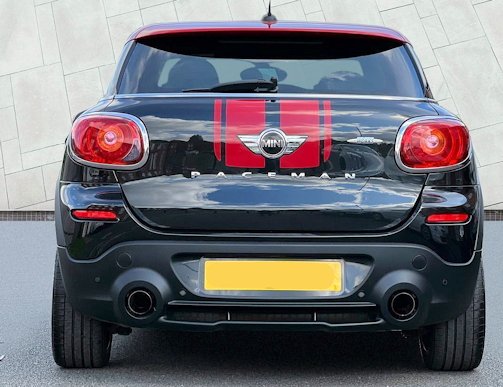
The SUV Coupé Mini Paceman was also available between March 2013 and November 2016 as JCW. As well as the first generation of the Countryman, the vehicle was powered by a 218 hp 1.6-liter gasoline engine. This accelerates the SUV in 6.8 seconds to 100 km / h. The maximum speed is the manufacturer with 229 km / h.
John Cooper Works GP Concept
At the International Motor Show in Frankfurt am Main in September 2017, the concept car Mini John Cooper Works GP Concept based on the Mini F56 was presented. The production car will succeed the John Cooper Works GP. The concept vehicle has the number 0059 on the flanks. This is a reminiscence of the first year of production of the Ur-Mini. The taillights are reminiscent of the Union Jack.
